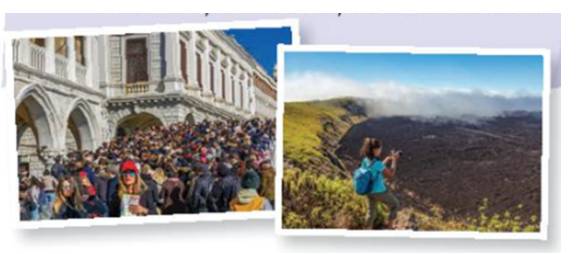Hãy nhập câu hỏi của bạn vào đây, nếu là tài khoản VIP, bạn sẽ được ưu tiên trả lời.

Tác động đến môi trường của du lịch
Mặc dù du lịch thường được gọi là 'ngành công nghiệp không khói', hoặc một ngành công nghiệp thân thiện với môi trường, nó thực sự có thể gây hại cho thiên nhiên. Tuy nhiên, các loại hình du lịch khác nhau có thể có những tác động khác nhau đến môi trường.
• Du lịch đại chúng là loại hình du lịch bao gồm hàng chục nghìn người tập trung ở cùng một địa điểm vào cùng một thời điểm trong năm. Nó thường có nhiều tác động tiêu cực đến khu vực địa phương, chẳng hạn như xả rác từ khách du lịch và ô nhiễm giao thông.
• Du lịch sinh thái cung cấp cho khách du lịch cơ hội khám phá thiên nhiên, đồng thời giúp bảo vệ môi trường và giáo dục du khách về các vấn đề môi trường tại địa phương. Nó cũng thúc đẩy sự tôn trọng của khách du lịch đối với cộng đồng địa phương.
• Du lịch bền vững không chỉ liên quan đến việc bảo vệ môi trường và tôn trọng văn hóa mà còn phải nỗ lực giữ lợi nhuận cho địa phương. Nó thường đề cập đến các hành động của ngành du lịch nói chung.
• Du lịch có trách nhiệm khuyến khích khách du lịch nhiều hơn là khách vãng lai. Khách du lịch có trách nhiệm không chỉ nhận thức được vai trò của mình mà còn phải tham gia vào việc bảo vệ môi trường, văn hóa và nâng cao lợi nhuận cho người dân địa phương. Du lịch có trách nhiệm thường liên quan đến các hành động cụ thể của cá nhân, doanh nghiệp và cộng đồng.

Bài 1: Sửa lỗi sai.
1. The local people have jobs in the nature=>natural reserve as guides and wardens and also has a voice in how the project develops.
2. Tourists stay in local houses with local people, not in special =>specially built hotels.
3. Tourists experience the local culture and do not take precious energy and water away from the locally =>local population.
4. Tourists travel by =>on foot, by boat, bicycle or elephant so that there is no pollution.
5. Ecotourism brings tourists a specially =>especially experience that they will remember all of their lives.
6. This type of tourism can only involve small =>a small number of people so it can be experience=>experienced

1. Read the text. Match the highlighted words with their meanings.
(Đọc văn bản. Nối các từ được làm nổi bật với nghĩa của chúng.)
The more people travel, the bigger impact they may have on the environment. How can we reduce it while travelling? Here are some advice.
Reduce your carbon footprint while travelling. Since flying produces more carbon footprint than any other means of transport, you should only fly when the trip is long. During the trip, you should walk, cycle or use public transport as much as you can. This not only helps to keep the environment clean, but also allows you to enjoy the beauty of nature and interact with local people.
Choose eco-friendly activities that benefit animals and the ecosystem. Avoid activities that allow you to touch or ride animals because they disturb their natural patterns and attract many people. Instead, visit wildlife parks or organic farms. These will help you understand and respect the nature more and stop doing things that harm the environment.
Answer:
1. interact ->b: to talk or do things with other people.
2. benefit ->a: to be good for someone or something.
3. disturb ->c: to interrupt what people are doing and make them angry.

1. educating-> educate
2. tried-> are trying
3. benefits -> benefit
4. that-> which
5. an -> the/ bỏ
6.to visiting-> to visit

Mai: Ms Hoa, what is (1) mass / sustainable tourism?
Ms Hoa: Well, the aim of this kind of tourism is to (2) protect / damage the environment, respect local culture, and keep (3) benefits / profits local.
Mai: Can you give me an example?
Ms Hoa: When travelling, we should not (4) litter / impact on the street. We should also be (5) aware / responsible of the local traditions and respect them.
Mai: So is this kind of tourism similar to (6) ecotourism / mass tourism?
Ms Hoa: Well, it's a form of sustainable tourism because it has a positive (7) impact / craft on the environment.

1.can apply to -> can apply for
2.going to visit -> go to visit
3.Have respect for local culture -> Have respected for local culture
4.and talking -> and talk


1. profit - crafts
2. aware - impact
3. responsible
1. We can help local artists make a profit by buying handmade arts and crafts.
(Chúng tôi có thể giúp các nghệ nhân địa phương kiếm lợi nhuận bằng cách mua các tác phẩm thủ công mỹ nghệ của họ.)
2. Many tourists are not aware of the impact of their actions on the local community.
(Nhiều khách du lịch không nhận thức được tác động của hành động của họ đối với cộng đồng địa phương.)
3. Both local people and tourists should be responsible for protecting the environment.
(Cả người dân địa phương và khách du lịch phải có trách nhiệm bảo vệ môi trường.)